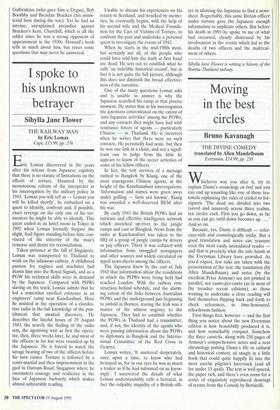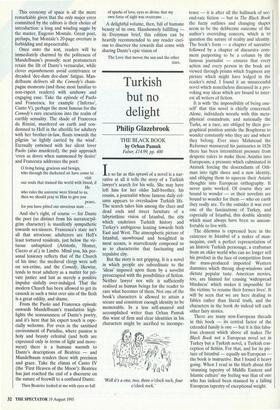Moving in the best circles
Bruno Kavanagh
THE DIVINE COMEDY translated by Allen Mandelbaum Everyman, £14.99, pp. 250 Whichever way you slice it, try to explain Dante's cosmology en bref and you can end up sounding like one of those tea- towels explaining the rules of cricket to for- eigners. 'The dead are divided into two (saved and unsaved) across three realms, ten circles each. First you go down, as far as you can go, until down becomes up . . . ' And so on.
Because, yes, Dante is difficult — refer- ence-rich and cosmologically tricky. But a good translation and notes can reassure even the most easily intimidated reader — and that is precisely what the safe hands at the Everyman Library have provided. As you'd expect, few risks are taken with the presentation of the text: the translation (by Allen Mandelbaum) and notes (by the excellent Peter Armour) are not printed in parallel, nor canto-per-canto (as in most of the trendier recent editions), so those wanting to undertake a close reading will find themselves flipping back and forth to check references, in time-honoured, schoolroom fashion.
First things first, however — and the first thing you notice about the new Everyman edition is how beautifully produced it is, and how remarkably compact. Somehow the three cantiche, along with 250 pages of Armour's comprehensive notes and a neat chronology putting Dante's life in cultural and historical context, sit snugly in a little book that could quite happily fit into the most ascetic pilgrim's haversack (and all for under 15 quid). The text is well-spaced, the paper rich, and there's even room for a series of exquisitely reproduced drawings of scenes from the Comedy by Botticelli. This economy of space is all the more remarkable given that the only major error committed by the editors is their choice of introduction: a long and winding saggio by the master, Eugenio Montale. Great poet, perhaps, but Montale's 20-page overture is forbidding and impenetrable.
Once onto the text, readers will be immediately charmed by the politeness of Mandelbaum's prosody: neat pentameters retain the lilt of Dante's vernacular, while clever enjambements avoid contrivance or dreaded `dee-dum dee-dum' fatigue. Man- delbaum delivers all the Comedy's cham- pagne moments (and those most familiar to non-expert readers) with unshowy and engaging ease. Take the episode of Paolo and Francesca, for example (Inferno', Canto V), perhaps the most famous for the Comedy's rare excursions into the realm of earthly sexuality. The shade of Francesca da Rimini, murdered on earth and con- demned to Hell in the afterlife for adultery with her brother-in-law, floats towards the pilgrim 'so lightly carried by the wind'. Eternally entwined with her silent lover Paolo (also murdered), the pair approach 'even as doves when summoned by desire' and Francesca addresses the poet: 0 living being, gracious and benign, who through the darkened air have come to
visit our souls that stained the world with blood, if He who rules the universe were friend to us, then we should pray to Him to give you peace, for you have pitied our atrocious state ...
And she's right, of course — for Dante the poet (as distinct from his narrator/pil- grim character) is manifestly sympathetic towards sex-sinners. Francesca's state isn't all that atrocious: adulterers are Hell's least tortured residents, just below the vir- tuous unbaptized (Aristotle, Homer, Cicero et al.) in Limbo. Mind you, his per- sonal leniency reflects that of the Church of his time: the medieval clergy were soft on sex-crime, and the Comedy, likewise, tends to treat adultery as a matter for pri- vate justice and lust as merely a positive impulse sinfully over-indulged. That the modern Church has been allowed to get its cassock in such a twist over sins of the flesh is a great oddity, and shame.
From the Paolo and Francesca episode onwards Mandelbaum's translation high- lights the sensuousness of Dante's poetry, and it's here that his expert touch is espe- cially welcome. For even in the sanitised environment of Paradise, where passion is holy and beauty celestial (and both are expressed only in terms of light and move- ment) there is a humane warmth to Dante's descriptions of Beatrice — and Mandelbaum renders these with precision and grace. Take the climax of Canto IV (the 'First Heaven of the Moon'): Beatrice has just reached the end of a discourse on the nature of freewill to a confused Dante:
Then Beatrice looked at me with eyes so full of sparks of love, eyes so divine that my own force of sight was overcome .. .
A delightful volume, then, full of humane beauty of its own. Handsomely fulfilling — its Everyman brief, this edition can be heartily recommended to any reader curi- ous to discover the rewards that come with sharing Dante's epic vision of
The Love that moves the sun and the other stars.



















































 Previous page
Previous page